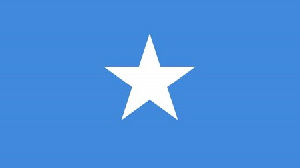BBC Hausa of Sunday, 17 September 2023
Source: BBC
Yadda ƴan Somaliya ke amfani da manhajar koyon karatu
Hodan Artan tana ɗinke wasu tsummokara da suke amfani da su a saman rufin gidanta.
Tana aiki ne a matsayin mai share-share a Hargesia, babban birnin yankin Somaliland.
Kasancewar kuɗin da take samu ƙalilan ne, muhallin da matar, mai shekara 23 za ta iya samu kawai shi ne wani ɗakin ƙasa da aka yi wa rufi da tsumma.
Ita da ɗaiyarta ne ke rayuwa a wannan ɗaki.
A baya, ba ta taɓa tunanin cewa tana da wani buri a nan gaba ba.
"Lokacin da nake ƙarama, ban samu damar zuwa makaranta ba, su ma iyayena ba su yi karatu ba." In ji ta.
Hodan ba ta taɓa koyon karatu ko rubutu ba.
Amma a ƴan watannin da suka gabata ta samu labarin wata manhaja da ake kira Daariz, wadda bayanai suka nuna cewa mutane sama da 410,000 ne suka ilimantu ta hanyar mahajar a ƙusurwar Afirka.
Bayan samun ƙwarin gwiwa daga ƙawayenta, Hoda ta rinƙa koyon abubuwa daga manhajar a lokacin da ba ta da ayyuka da yawa - sai ga shi a cikin wata biyu kacal ta koyi abubuwa da dama: yanzu tana iya karantawa da kuma fahimtar labarun da aka rubuta da harshen Somali.
Akwai irin waɗannan labarai da dama a Somaliland, wani yanki da ya daɗe yana fama da matsalar rashin ilimi.
A shekarar 1991 ne yankin ya ayyana ƴancin kai a lokacin da yake fama da yaƙin basasa.
Ƙasashen duniya dai ba su amince da yankin a matsayin ƙasa ba, sai dai yana da zaɓaɓɓiyar gwamnatinsa kuma yankin ya samu kwanciyar hankali fiye da sauran yankin Somalia.
Matsalolin da yaƙi ya haifar, kamar rashin kayan more rayuwa da fari sun sayna yankin ya zama ɗaya daga cikin yankunan da ilimi ya yi ƙaranci sosai a duniya.
Alƙaluma
Her case is far from unique in Somaliland, a place that has long struggled with illiteracy.
The region declared independence in 1991 in the course of a civil war. It is not internationally recognised as a separate state, but it has a democratically elected government and has enjoyed greater stability than the rest of Somalia.
The legacy of the war, the lack of infrastructure and a recurring drought have made it one of the regions with the lowest literacy rates in the world.
According to data from 2022 from the UN children's agency, Unicef, around three in every four adults cannot read and write and one child in four is not in school.
In 2019, the Somaliland government and Unicef announced a joint investment in education, aimed at reaching more children and ensuring they could complete at least their primary education.
But even so, progress has been slow and big challenges remain.
"A lot of the population are pastoralists and rural. They are isolated. Some of them are on the move," says Peter Quamo, education chief at Unicef Somalia.
"And it's not just Somaliland. Somalia [and] South Sudan have a similar large population like that. It's very difficult sometimes to sustain education with those children and those families," he adds.
The issue of how to reach those kids has been the focus of many education projects in the region, launched both by the local authorities and international NGOs.
But Ismail Ahmed and his charity, the Sahamiye Foundation, believe they have found the perfect formula to work around it.
Mr Ahmed left Somaliland for the UK as a refugee in his early 20s.
His life is quite an extraordinary journey: he studied in some of London's top business schools and got a job at the UN. But he was fired after he alleged corruption within the organisation and, with the compensation he was awarded for being wrongly dismissed, he launched a successful money transfer app, World Remit.
When he stepped down from leading the company, he created the Sahamiye Foundation to "give back to his community", he says.
He tells me that during the Covid lockdown, as he was trying to teach Somali to his children in London, he came up with the idea of using "mobile phones to tackle the learning crisis" in his country of origin.
Daariz was his brainchild. The app is free and can work offline, enabling people in remote areas and on the move to use it.
Mr Ahmed is confident this is the way of the future.
"It used to take us to go to class to learn our own mother tongue," he says, "and now we have thousands of users who were able to be functionally literate in their own tongue without going to a class."
About 10km (six miles) outside Hargeisa, Mubaarik Mahdi is taking his camels out to pasture.
When he was a child, he could only go to school for two years and he does not remember much.
Doing business had become difficult for him. With most people nowadays using mobile payment apps like Zaad, Mr Mahdi was struggling even to read his customers' names on payment slips, he says.
So now, as his camels are scattered in the field, feeding on thick green bushes, Mr Mahdi sits in the shade of a tree and mumbles slowly the words on his screen.
He says thanks to learning on his phone, he has become more confident dealing with his customers on his mobile and has even started buying books.
Back in Hargeisa, as she is washing the dishes in her employer's kitchen, Ms Artan says learning to read has changed her perspective.
"I feel that I no longer belong to where I was yesterday," she says proudly.
"For the future, I hope to secure a more fulfilling position than my current job and use my skills and knowledge to succeed."
Entertainment













